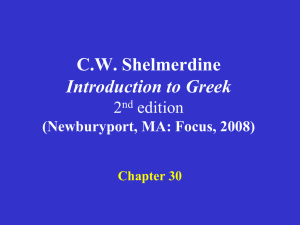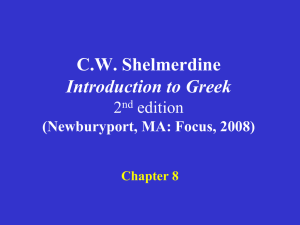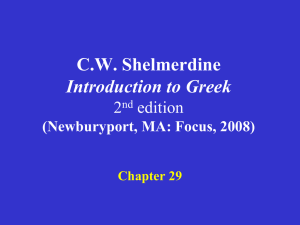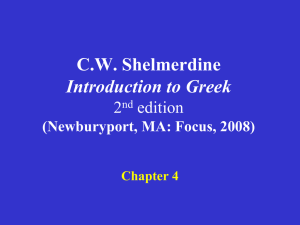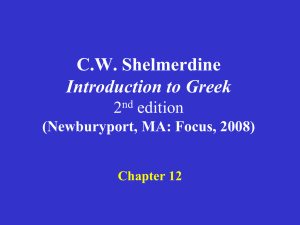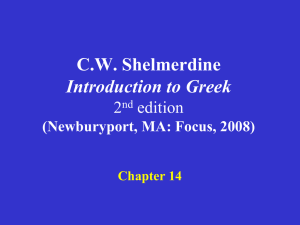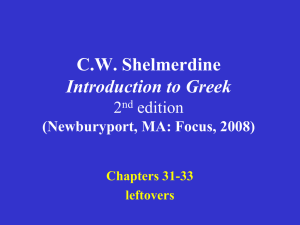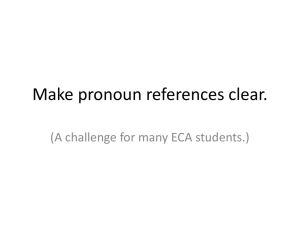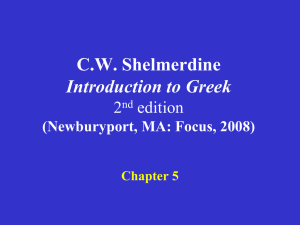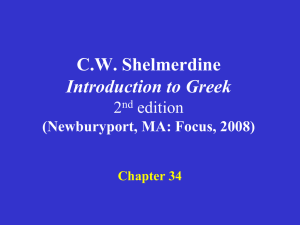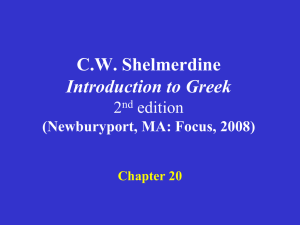Shelmerdine Chapter 10
advertisement
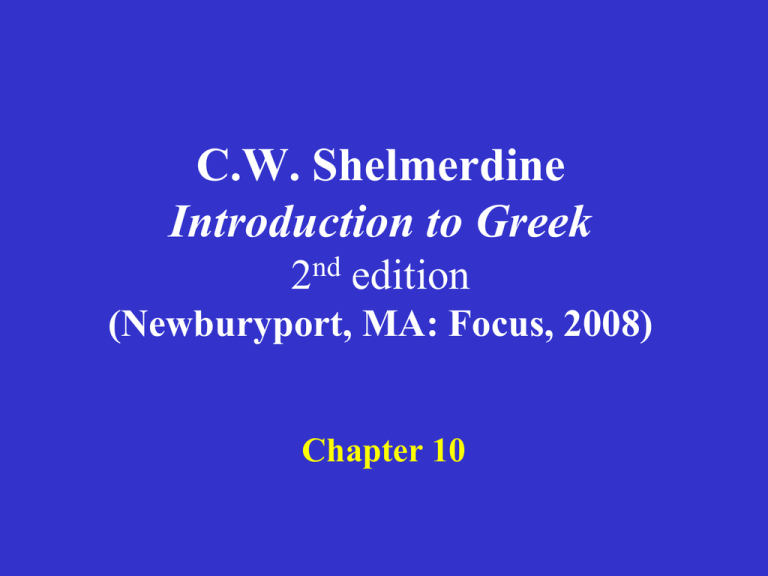
C.W. Shelmerdine Introduction to Greek 2nd edition (Newburyport, MA: Focus, 2008) Chapter 10 Shelmerdine Chapter 10 1. 3rd declension nouns: stems in -ντ, -κτ 2. The future and imperfect indicative of εἰμί, ‘be’ 3. The relative pronoun Shelmerdine Chapter 10 1. 3rd declension nouns: stems in -ντ, -κτ 2. The future and imperfect indicative of εἰμί, ‘be’ 3. The relative pronoun Shelmerdine Chapter 10 1. 3rd declension nouns: stems in -ντ, -κτ • stems in -κτ • Recall that – – • • a dental (τ, δ, θ) followed by a σ yields just a σ. a palatal (κ, γ, χ) followed by a σ is written ξ. The nominative singular and the dative plural both combine the -τσ to -σ, as is standard for dentals. This leaves the combination κσ, which is written ξ. Shelmerdine Chapter 10 1. 3rd declension nouns: stems in -ντ, -κτ Thus the forms of νύξ, νυκτός ἡ “night” singular Nom. νύξ Gen. νυκτός Dat. νυκτί Acc. νύκτα Voc. = nom. plural Nom. νύκτες Gen. νυκτῶν Dat. νυξί Acc. νύκτας Voc. = nom. nom. sg.: νυκτσ νυκσ νυξ dat. pl.: νυκτσι νυκσι νυξι Shelmerdine Chapter 10 1. 3rd declension nouns: stems in -ντ, -κτ • • An important class of third declension nouns have stems in -ντ. The nominative singular and the dative plural both combine the -τσ to -σ, as is standard for dentals. Shelmerdine Chapter 10 1. 3rd declension nouns: stems in -ντ, -κτ • The combination -νσ, however, is generally forbidden in Greek, so the -σ disappears and the preceding vowel lengthens to make up for the lost σ (ο ω). The dative plural contracts likewise but drops the ν and lengthens the preceding vowel to ου (instead of ω). Shelmerdine Chapter 10 1. 3rd declension nouns: stems in -ντ, -κτ Thus the forms of λέων, λέοντος ὁ “lion” singular Nom. λέων Gen. λέοντος Dat. λέοντι Acc. λέοντα Voc. λέον plural Nom. λέοντες Gen. λεόντων Dat. λέουσι Acc. λέοντας Voc. = nom. nom. sg.: λεοντς λεονς λεων dat. pl.: λεοντσι λεονσι λεουσι Shelmerdine Chapter 10 1. 3rd declension nouns: stems in -ντ, -κτ 2. The future and imperfect indicative of εἰμί, ‘be’ 3. The relative pronoun Shelmerdine Chapter 10 singular • εἰμί “I am” • εἶ “you are” • ἐστί(ν) “(s)he, it is” plural • ἐσμέν “we are” • ἐστέ “you/y’all are” • εἰσί(ν) “they are” present tense indicative active Except for the 2nd person singular, all forms are enclitic. Shelmerdine Chapter 10 singular • ἔσομαι “I will be” • ἔσῃ or ἔσει “you will be” • ἔσται “(s)he, it will be” plural • ἐσόμεθα “we will be” • ἔσεσθε “you/y’all will be” • ἔσονται “they will be” future tense indicative active You see the regular stem ἔσ- in these forms. The endings come from the middle voice (which you learn in Chapter 17). Shelmerdine Chapter 10 singular • ἦ or ἦν “I was” • ἦσθα “you were” • ἦν “(s)he, it was” plural • ἦμεν“we were” • ἦτε “you/y’all were” • ἦσαν “they were” imperfect tense indicative active The ἦ- stem is augmented from ἔσ- and the -σ- reduced. The endings are roughly secondary personal endings (similar to those of the imperfect and aorist). Shelmerdine Chapter 10 1. 3rd declension nouns: stems in -ντ, -κτ 2. The future and imperfect indicative of εἰμί, ‘be’ 3. The relative pronoun Shelmerdine Chapter 10 3. The relative pronoun • The Greek relative pronoun (“who, which”) consists essentially of 1st and 2nd declension endings with a rough breathing (accented like an ultima). singular Nom. Gen. Dat. Acc. m. ὅς οὗ ᾧ ὅν f. n. ἥ ὅ ἧς οὗ ᾗ ᾧ ἥν ὅ plural Nom. Gen. Dat. Acc. m. οἵ ὧν οἷς οὕς f. αἵ ὧν αἷς ἅς n. ἅ ὧν οἷς ἅ Shelmerdine Chapter 10 3. The relative pronoun • The relative pronoun represents another way to connect two sentences, in particular two sentences in which the same noun appears. For example: ὁ παῖς ἔχει ἵππον. [antecedent] • – • “The child has a horse.” τὸν παῖδον διδάσκω. [replace with a relative pronoun.] – • “I teach the child.” ὁ παῖς ὃν διδάσκω ἔχει ἵππον. – “The child whom I teach has a horse.” Shelmerdine Chapter 10 3. The relative pronoun • The relative pronoun takes on the same gender, number, and case of the noun it replaces: ὁ παῖς ἔχει ἵππον. [antecedent] • – • “The child has a horse.” τὸν παῖδον διδάσκω. [masc. sg. acc.] – • “I teach the child.” ὁ παῖς ὃν διδάσκω ἔχει ἵππον. [masc. sg. acc.] – “The child whom I teach has a horse.” Shelmerdine Chapter 10 3. The relative pronoun • The relative pronoun takes on the same gender, number, and case of the noun it replaces: ὁ παῖς ἀγαθός ἐστιν. [antecedent] • – • “The child is good.” ὁ παῖς πέμπει δῶρον. [masc. sg. nom.] – • “The child sends a gift.” ὁ παῖς ὃς πέμπει δῶρον ἀγαθός ἐστιν. [masc. sg. nom.] – “The child who sends a gift is good.” Shelmerdine Chapter 10 3. The relative pronoun • The relative pronoun takes on the same gender, number, and case of the noun it replaces: πιστεύσομεν τῷ παιδί. [antecedent] • – • “We will trust the child.” ὁ παῖς ἀγαθὰ λέγει. [masc. sg. nom.] – • “The child says good things.” πιστεύσομεν τῷ παιδί ὃς ἀγαθὰ λέγει. [masc. sg. nom.] – “We will trust the child who says good things.” Shelmerdine Chapter 10 3. The relative pronoun • The relative pronoun takes on the same gender, number, and case of the noun it replaces: ὁ παῖς ἀγαθός ἐστιν. [antecedent] • – • “The child is good.” τῷ παιδί λέγω. [masc. sg. dat.] – • “I speak to the child.” ὁ παῖς ᾧ λέγω ἀγαθός ἐστιν. [masc. sg. dat.] – “The child to whom I speak is good.” Shelmerdine Chapter 10 3. The relative pronoun • The relative pronoun takes on the same gender, number, and case of the noun it replaces: ὁ παῖς ἀγαθός ἐστιν. [antecedent] • – • “The child is good.” ὁ τοῦ παιδὸς δοῦλος λέγει. [masc. sg. gen.] – • “Τhe child’s slave is speaking.” ὁ παῖς οὗ ὁ δοῦλος λέγει ἀγαθός ἐστιν. [masc. sg. gen.] – “The child whose slave is speaking is good.” The Achaemenid Rulers of Persia Cyrus the Great Xerxes Xerxes invades Greece Thermopylae Athens Shelmerdine Chapter 10 ὅτε δὲ ὁ Ξέρξης ἐστράτευεν ἐπὶ τὴν Ἑλλάδα, οἱ Λακεδαιμόνιοι ἐφύλαττον τὴν ἐν ταῖς Θερμοπύλαις εἰσβολήν· καὶ πρὸ τῆς μάχης λέγει τις τῶν συμμάχων, Τοσοῦτος ἐστιν ὁ ἀριθμὸς τῶν βαρβάρων, ὥστε ἀποκρύπτουσι τὸν ἥλιον τοῖς τοξεύμασιν. Ἀγαθὰ ἀγγέλλεις, λέγει Λακεδαιμόνιός στρατιώτης, ὀνόματι Διηκένης· ὑπὸ οὖν σκιᾷ ἔσται πρὸς αὐτοὺς ἡ μάχη, καὶ οὐκ ἐν ἡλίῳ. Shelmerdine Chapter 10 ὁ δὲ Λεωνίδας, ὃς ἦν ὁ τῶν Λακεδαιμονίων στρατηγός, ἐκέλευσε τοὺς στρατιώτας μένειν καὶ ἀνδρείους εἶναι. ἐν δὲ τῇ μάχῃ αὐτῇ οἱ λοχαγοὶ τοὺς Πέρσας μάστιξιν ἐποτρύνουσιν· οἱ γὰρ βάρβαροι οὐκ ἀνδρεῖοι εἶσιν. οἱ δὲ Λακεδαιμόνιοι ἀνδρείως μὲν φυλάττουσι τὴν εἰσβολὴν ὑπὲρ τῆς πατρίδος, μάτην δέ· μόνον γὰρ τριακόσιοι εἶσιν. ὁ δὲ Λεωνίδας αὐτὸς ἐν τῇ μάχῃ πίπτει· καὶ νῦν ἐστιν ἐπὶ τῷ τάφῳ αὐτοῦ λίθινος λέων. Leonidas and his 300 Spartans at Thermopylae Epitaph for the Spartans at Thermopylae The Legacy of Thermopylae The Legacy of Thermopylae Shelmerdine Chapter 10 …δώσει ψυχὴν ἀντὶ ψυχῆς, 24 ὀφθαλμὸν ἀντὶ ὀφθαλμοῦ, ὀδόντα ἀντὶ ὀδόντος, χεῖρα ἀντὶ χειρός, πόδα ἀντὶ ποδός, 25 κατάκαυμα ἀντὶ κατακαύματος, τραῦμα ἀντὶ τραύματος, μώλωπα ἀντὶ μώλωπος. ἀντί +gen. in place of δώσει “he will give” κατάκαυμα –ατος τό burning μώλωπα –ωπος τό stripe ὀδούς, ὀδόντος τό tooth ὀφθαλμός –οῦ ὁ eye πούς, ποδός ὁ foot τραῦμα –ατος τό wound χείρ, χειρός ἡ hand ψυχή, ψυχῆς ἡ life, soul Shelmerdine Chapter 10 26 ἐὰν δέ τις πατάξῃ τὸν ὀφθαλμὸν τοῦ οἰκέτου αὐτοῦ ἢ τὸν ὀφθαλμὸν τῆς θεραπαίνης αὐτοῦ καὶ ἐκτυφλώσῃ, ἐλευθέρους ἐξαποστελεῖ αὐτοὺς ἀντὶ τοῦ ὀφθαλμοῦ αὐτῶν. ἀντί +gen. in place of ἐὰν = εἰ if ἐκτυφλώσῃ “goes blind” ἐλεύθερος –α –ον free ἐξαποστελεῖ “he will set free” θεραπαῖνη –ης ἡ (female) servant οἰκέτης –ου ὁ (male) servant ὀφθαλμός –οῦ ὁ eye πατάξῃ “strikes” τις (nom. sg.) someone, anyone Shelmerdine Chapter 10 27 ἐὰν δὲ τὸν ὀδόντα τοῦ οἰκέτου ἢ τὸν ὀδόντα τῆς θεραπαίνης αὐτοῦ ἐκκόψῃ, ἐλευθέρους ἐξαποστελεῖ αὐτοὺς ἀντὶ τοῦ ὀδόντος αὐτῶν. ἀντί +gen. in place of ἐὰν = εἰ if ἐκκόψῃ “knocks out” ἐλεύθερος –α –ον free ἐξαποστελεῖ “he will set free” θεραπαῖνη –ης ἡ (female) servant ὀδούς, ὀδόντος τό tooth οἰκέτης –ου ὁ (male) servant ὀφθαλμός –οῦ ὁ eye Shelmerdine Chapter 10 28 Ἐὰν δὲ κερατίσῃ ταῦρος ἄνδρα ἢ γυναῖκα, καὶ ἀποθάνῃ, λίθοις λιθοβοληθήσεται ὁ ταῦρος, καὶ οὐ βρωθήσεται τὰ κρέα αὐτοῦ· ὁ δὲ κύριος τοῦ ταύρου ἀθῷος ἔσται. ἀθῷος –ον “unpunished, unharmed” ἄνδρα (acc sg.) “man” ἀποθάνῃ “dies” βρωθήσεται “will be eaten” γυναῖκα (acc sg.) “woman” ἐὰν = εἰ “if” κερατίσῃ “rams a horn into, gores” κρέα (neut. nom. pl.) “meat” κύριος –ου ὁ “master, owner, lord” λιθοβοληθήσεται “will be stoned” λίθος –ου ὁ stone ταῦρος -ου ὁ “bull”
